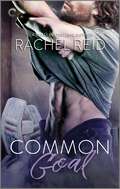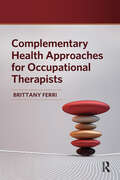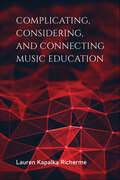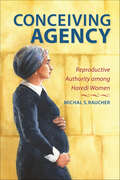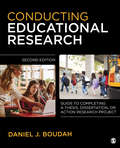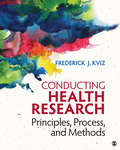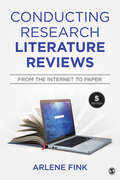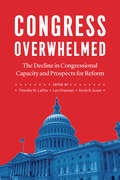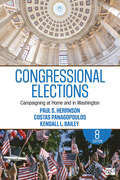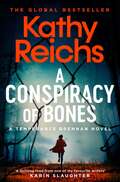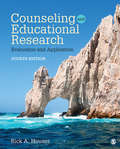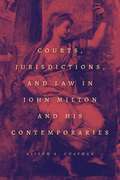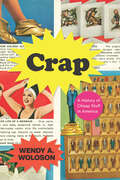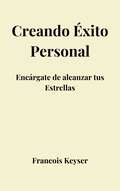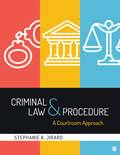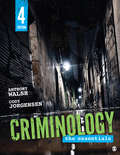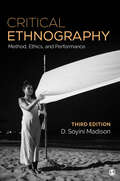- Table View
- List View
Common Goal: A Gay Sports Romance (Game Changers #4)
by Rachel Reid&“Rachel Reid&’s hockey heroes are sexy, hot, and passionate! I&’ve devoured this entire series and I love the flirting, the exploration and the delicious discovery in Common Goal!&” —Lauren Blakely, #1 New York Times bestselling author of A Guy Walks into My Bar New York Admirals goalie Eric never thought his friends-with-benefits arrangement with much-younger Kyle would leave them both wanting more…Veteran goaltender Eric Bennett has faced down some of the toughest shooters on the ice, but nothing prepared him for his latest challenge—life after hockey. It&’s time to make some big changes, starting with finally dating men for the first time.Graduate student Kyle Swift moved to New York nursing a broken heart. He&’d sworn to find someone his own age to crush on (for once). Until he meets a gorgeous, distinguished silver fox hockey player. Despite their intense physical attraction, Kyle has no intention of getting emotionally involved. He&’ll teach Eric a few tricks, have some mutually consensual fun, then walk away.Eric is more than happy to learn anything Kyle brings to the table. And Kyle never expected their friends-with-benefits arrangement to leave him wanting more. Happily-ever-after might be staring them in the face, but it won&’t happen if they&’re too stubborn to come clean about their feelings.Everything they both want is within reach… They just have to be brave enough to grab it.USA TODAY bestselling author Rachel ReidGame ChangersBook 1: Game ChangerBook 2: Heated RivalryBook 3: Tough GuyBook 4: Common GoalBook 5: Role ModelBook 6: The Long Game
Complementary Health Approaches for Occupational Therapists
by Brittany FerriComplementary Health Approaches for Occupational Therapists provides practitioners and students with foundational knowledge on complementary and integrative health. This guide is a great asset for occupational therapy students at the graduate level and practicing therapists wanting to incorporate these modalities into their treatment or to gain information regarding new trends in practice.Written by Brittany Ferri, MS, OTR/L, CCTP, this text enhances one’s occupational therapy education as it pertains to treatment addressing occupational performance. Introductory information is provided on more than 30 complementary and alternative modalities, including acupuncture, aquatic therapy, massage therapy, and tai chi. In Complementary Health Approaches for Occupational Therapists, each modality’s chapter includes: Basic guidelines for established complementary and alternative modalities that can be used in practice Literature reviews of the scientific benefits or lack thereof Credentials needed to practice, when applicable Contraindications, precautions, and side effects Practical applications in occupational therapy practice Included with the text are online supplemental materials for faculty use in the classroom.New modalities are constantly generating within occupational therapy. Complementary Health Approaches for Occupational Therapists will help differentiate between new modalities while also encouraging therapists to remain true to the roots of their profession in research and best practice.
Complicating, Considering, and Connecting Music Education (Counterpoints: Music and Education)
by Lauren Kapalka RichermeIn Complicating, Considering, and Connecting Music Education, Lauren Kapalka Richerme proposes a poststructuralist-inspired philosophy of music education. Complicating current conceptions of self, other, and place, Richerme emphasizes the embodied, emotional, and social aspects of humanity. She also examines intersections between local and global music making. Next, Richerme explores the ethical implications of considering multiple viewpoints and imagining who music makers might become. Ultimately, she offers that music education is good for facilitating differing connections with one's self and multiple environments. Throughout the text, she also integrates the writings of Gilles Deleuze and Félix Guattari with narrative philosophy and personal narratives. By highlighting the processes of complicating, considering, and connecting, Richerme challenges the standardization and career-centric rationales that ground contemporary music education policy and practice to better welcome diversity.
Conceiving Agency: Reproductive Authority among Haredi Women
by Michal S. RaucherConceiving Agency: Reproductive Authority among Haredi Women explores the ways Haredi Jewish women make decisions about their reproductive lives. Although they must contend with interference from doctors, rabbis, and the Israeli government, Haredi women find space for—and insist on—autonomy from them when they make decisions regarding the use of contraceptives, prenatal testing, fetal ultrasounds, and other reproductive practices. Drawing on their experiences of pregnancy, knowledge of cultural norms of reproduction, and theological beliefs, Raucher shows that Haredi women assert that they are in the best position to make decisions about reproduction.Conceiving Agency puts forward a new view of Haredi women acting in ways that challenge male authority and the structural hierarchies of their conservative religious tradition. Raucher asserts that Haredi women's reproductive agency is a demonstration of women's commitment to Haredi life and culture as well as an indication of how they define religious ethics.
Conducting Educational Research: "Guide to Completing a Thesis, Dissertation, or Action Research Project"
by Daniel Joseph BoudahDesigned to be used during the research process, Conducting Educational Research: Guide to Completing a Thesis, Dissertation, or Action Research Project, Second Edition walks readers through each step of a research project or thesis, including developing a research question, performing a literature search, developing a research plan, collecting and analyzing data, drawing conclusions, and sharing the conclusions with others. Throughout the book, Daniel J. Boudah covers all types of research (including experimental, descriptive, qualitative, group designs, and single subject designs) and helps readers link research questions to designs, designs to data sources and data sources to appropriate analyses. Each chapter includes activities and exercises to ensure the researcher is asking the right questions and producing a quality project.
Conducting Educational Research: "Guide to Completing a Thesis, Dissertation, or Action Research Project"
by Daniel Joseph BoudahDesigned to be used during the research process, Conducting Educational Research: Guide to Completing a Thesis, Dissertation, or Action Research Project, Second Edition walks readers through each step of a research project or thesis, including developing a research question, performing a literature search, developing a research plan, collecting and analyzing data, drawing conclusions, and sharing the conclusions with others. Throughout the book, Daniel J. Boudah covers all types of research (including experimental, descriptive, qualitative, group designs, and single subject designs) and helps readers link research questions to designs, designs to data sources and data sources to appropriate analyses. Each chapter includes activities and exercises to ensure the researcher is asking the right questions and producing a quality project.
Conducting Health Research: Principles, Process, and Methods
by Frederick J. KvizConducting Health Research: Principles, Process, and Methods presents an integrated and practical introduction to the principles and strategies for planning, implementing, reporting, and assessing health sciences research. Comprehensive in its breadth and depth, with an accessible writing style, this text prepares students in public health and related fields to be adept researchers and consumers of health research. Through real-world examples and step-by-step guidance, Frederick J. Kviz provides students with the skills they need to: identify and evaluate research strengths and limitations as practitioners; to actually perform the various core aspects of research; and to choose among alternative methods when making decisions about health practice, policy, and future research needs.
Conducting Health Research: Principles, Process, and Methods
by Frederick J. KvizConducting Health Research: Principles, Process, and Methods presents an integrated and practical introduction to the principles and strategies for planning, implementing, reporting, and assessing health sciences research. Comprehensive in its breadth and depth, with an accessible writing style, this text prepares students in public health and related fields to be adept researchers and consumers of health research. Through real-world examples and step-by-step guidance, Frederick J. Kviz provides students with the skills they need to: identify and evaluate research strengths and limitations as practitioners; to actually perform the various core aspects of research; and to choose among alternative methods when making decisions about health practice, policy, and future research needs.
Conducting Research Literature Reviews: From the Internet to Paper
by Arlene G. FinkProviding readers with an accessible, in-depth look at how to synthesize research literature, Conducting Research Literature Reviews: From the Internet to Paper is perfect for students, researchers, marketers, planners, and policymakers who design and manage public and private agencies, conduct research studies, and prepare strategic plans and grant proposals. Bestselling author Arlene Fink shows readers how to explain the need for and significance of research, as well as how to explain a study’s findings. Offering a step-by-step approach to conducting literature reviews, the Fifth Edition features new research, examples, and references from the social, behavioral, and health sciences, expanded coverage of qualitative research, updated and revised meta-analysis procedures, a brand new glossary of key terms, double the number of exercises, and additional examples of how to write reviews.
Conducting Research Literature Reviews: From the Internet to Paper
by Arlene G. FinkProviding readers with an accessible, in-depth look at how to synthesize research literature, Conducting Research Literature Reviews: From the Internet to Paper is perfect for students, researchers, marketers, planners, and policymakers who design and manage public and private agencies, conduct research studies, and prepare strategic plans and grant proposals. Bestselling author Arlene Fink shows readers how to explain the need for and significance of research, as well as how to explain a study’s findings. Offering a step-by-step approach to conducting literature reviews, the Fifth Edition features new research, examples, and references from the social, behavioral, and health sciences, expanded coverage of qualitative research, updated and revised meta-analysis procedures, a brand new glossary of key terms, double the number of exercises, and additional examples of how to write reviews.
Congress Overwhelmed: The Decline in Congressional Capacity and Prospects for Reform
by Timothy M. LaPira Lee Drutman Kevin R. KosarCongress today is falling short. Fewer bills, worse oversight, and more dysfunction. But why? In a new volume of essays, the contributors investigate an underappreciated reason Congress is struggling: it doesn’t have the internal capacity to do what our constitutional system requires of it. Leading scholars chronicle the institutional decline of Congress and the decades-long neglect of its own internal investments in the knowledge and expertise necessary to perform as a first-rate legislature. Today’s legislators and congressional committees have fewer—and less expert and experienced—staff than the executive branch or K Street. This leaves them at the mercy of lobbyists and the administrative bureaucracy. The essays in Congress Overwhelmed assess Congress’s declining capacity and explore ways to upgrade it. Some provide broad historical scope. Others evaluate the current decay and investigate how Congress manages despite the obstacles. Collectively, they undertake the most comprehensive, sophisticated appraisal of congressional capacity to date, and they offer a new analytical frame for thinking about—and improving—our underperforming first branch of government.
Congressional Elections: Campaigning at Home and in Washington (Power, Conflict And Democracy Ser.)
by Costas Panagopoulos Paul S. Herrnson Kendall L. Bailey"It is the gold standard for texts on congressional campaigns and elections." — Bruce A. Larson, Gettysburg College In Congressional Elections: Campaigning at Home and in Washington authors Paul Herrnson and Costas Panagopoulos combine top-notch research with real-world politics as they argues that successful candidates run two campaigns: one for votes, the other for resources. Using campaign finance data, original survey research, and hundreds of interviews with candidates and political insiders, Herrnson and Panagopoulos look at how this dual strategy affects who wins and how it ultimately shapes the entire electoral system. The Eighth Edition considers the impact of the Internet and social media on campaigning in the 2018 elections; the growing influence of interest groups; and the influence of new voting methods on candidate, party, and voter mobilization tactics.
Congressional Elections: Campaigning at Home and in Washington (Power, Conflict And Democracy Ser.)
by Costas Panagopoulos Paul S. Herrnson Kendall L. Bailey"It is the gold standard for texts on congressional campaigns and elections." — Bruce A. Larson, Gettysburg College In Congressional Elections: Campaigning at Home and in Washington authors Paul Herrnson and Costas Panagopoulos combine top-notch research with real-world politics as they argues that successful candidates run two campaigns: one for votes, the other for resources. Using campaign finance data, original survey research, and hundreds of interviews with candidates and political insiders, Herrnson and Panagopoulos look at how this dual strategy affects who wins and how it ultimately shapes the entire electoral system. The Eighth Edition considers the impact of the Internet and social media on campaigning in the 2018 elections; the growing influence of interest groups; and the influence of new voting methods on candidate, party, and voter mobilization tactics.
A Conspiracy of Bones (A Temperance Brennan Novel #19)
by Kathy ReichsTHE SUNDAY TIMES BESTSELLER A RICHARD AND JUDY BOOK CLUB PICK 'Read this book&’ DAVID BALDACCI 'One of the absolute best thrillers of the year&’ JEFFERY DEAVER 'You will find it hard to put down' MARK BOWDEN EVERY BODY HAS SECRETS It all starts with a series of text messages. Each message contains a new picture of a corpse, missing its face and hands. Dr Temperance Brennan needs to find out who the dead man is, and why the images were sent to her. The only problem is, she has been kicked off the team. So she goes rogue, knowing that she is the only one who can solve this case. As she starts her investigation she discovers a connection to a decade-old missing child case. The more she uncovers, the darker and more twisted the picture becomes . . .***Don't miss the new high-stakes Temperance Brennan thriller – THE BONE HACKER is available for pre-order now . . .***Praise for A Conspiracy of Bones 'I can&’t recall when this many twists have been so masterfully woven into a novel. A great series has just gotten greater' JEFFERY DEAVER, #1 internationally bestseller author of The Bone Collector and The Never Game 'A Conspiracy of Bones shows off Kathy Reichs&’ dazzling new level of plotting mastery.' KARIN SLAUGHTER, #1 internationally bestselling author of The Last Widow and The Good Daughter 'Reich's fast-paced, tightly-constructed, and very contemporary story dives underground here, both literally and virtually, as she follows the thinnest of threads deeper and deeper into a shocking conspiracy. You will find it hard to put down' MARK BOWDEN, #1 New York Times bestselling author of The Last Stone and Black Hawk Down 'So many pulse-pounding twists and surprises—it kept me guessing till the end!' R.L. STINE, bestselling author Goosebumps and Fear Street 'This is Kathy Reichs doing what she does best: sorting through the bones until the shocking end' BRAD MELTZER, #1 New York Times bestselling author of The Escape Artist 'Kathy Reichs writes brilliant mysteries that are as realistic as non-fiction and as fast-paced as the best thrillers about Jack Reacher or Alex Cross' JAMES PATTERSON 'Nobody does forensics thrillers like Kathy Reichs. She&’s the real deal' DAVID BALDACCI 'Each book in the Temperance Brennan series is better than the last, I just can&’t get enough!' LISA SCOTTOLINE 'Every minute in the morgue with Tempe is golden' THE NEW YORK TIMES BOOK REVIEW
Counseling and Educational Research: Evaluation and Application
by Rick A. HouserCounseling and Educational Research: Evaluation and Application prepares readers to be good consumers and evaluators of research. Using concrete examples from published articles, author Rick A. Houser teaches students to take a systematic approach to evaluating professional literature critically and using it responsibly. The Fourth Edition covers evidence-based research, qualitative methods, program evaluation, and mixed methods; includes new discussions on how national accreditation standards in counseling (CACREP) and education (CAEP) apply to research; and examines how cultural influences can affect the research process.
Counseling and Educational Research: Evaluation and Application
by Rick A. HouserCounseling and Educational Research: Evaluation and Application prepares readers to be good consumers and evaluators of research. Using concrete examples from published articles, author Rick A. Houser teaches students to take a systematic approach to evaluating professional literature critically and using it responsibly. The Fourth Edition covers evidence-based research, qualitative methods, program evaluation, and mixed methods; includes new discussions on how national accreditation standards in counseling (CACREP) and education (CAEP) apply to research; and examines how cultural influences can affect the research process.
Courts, Jurisdictions, and Law in John Milton and His Contemporaries
by Alison A. ChapmanJohn Milton is widely known as the poet of liberty and freedom. But his commitment to justice has been often overlooked. As Alison A. Chapman shows, Milton’s many prose works are saturated in legal ways of thinking, and he also actively shifts between citing Roman, common, and ecclesiastical law to best suit his purpose in any given text. This book provides literary scholars with a working knowledge of the multiple, jostling, real-world legal systems in conflict in seventeenth-century England and brings to light Milton’s use of the various legal systems and vocabularies of the time—natural versus positive law, for example—and the differences between them. Surveying Milton’s early pamphlets, divorce tracts, late political tracts, and major prose works in comparison with the writings and cases of some of Milton’s contemporaries—including George Herbert, John Donne, Ben Jonson, and John Bunyan—Chapman reveals the variety and nuance in Milton’s juridical toolkit and his subtle use of competing legal traditions in pursuit of justice.
Crap: A History of Cheap Stuff in America
by Wendy A. WolosonCrap. We all have it. Filling drawers. Overflowing bins and baskets. Proudly displayed or stuffed in boxes in basements and garages. Big and small. Metal, fabric, and a whole lot of plastic. So much crap. Abundant cheap stuff is about as American as it gets. And it turns out these seemingly unimportant consumer goods offer unique insights into ourselves—our values and our desires. In Crap: A History of Cheap Stuff in America, Wendy A. Woloson takes seriously the history of objects that are often cynically-made and easy to dismiss: things not made to last; things we don't really need; things we often don't even really want. Woloson does not mock these ordinary, everyday possessions but seeks to understand them as a way to understand aspects of ourselves, socially, culturally, and economically: Why do we—as individuals and as a culture—possess these things? Where do they come from? Why do we want them? And what is the true cost of owning them? Woloson tells the history of crap from the late eighteenth century up through today, exploring its many categories: gadgets, knickknacks, novelty goods, mass-produced collectibles, giftware, variety store merchandise. As Woloson shows, not all crap is crappy in the same way—bric-a-brac is crappy in a different way from, say, advertising giveaways, which are differently crappy from commemorative plates. Taking on the full brilliant and depressing array of crappy material goods, the book explores the overlooked corners of the American market and mindset, revealing the complexity of our relationship with commodity culture over time. By studying crap rather than finely made material objects, Woloson shows us a new way to truly understand ourselves, our national character, and our collective psyche. For all its problems, and despite its disposability, our crap is us.
Creando Éxito Personal: Encárgate de alcanzar tus Estrellas
by Francois KeyserSólo tienes una vida. Haz que cuente....... Cada segundo. Todos cometemos errores y aprendemos de ellos. Pero ¿y si pudiéramos evitar cometer algunos errores? ¿Errores que podrían tener un impacto muy duradero en nuestras vidas, especialmente si los cometemos a una edad temprana en nuestra educación terciaria o carreras? ¿Qué pasaría si alguien quisiera compartir los errores que muchos de nosotros cometemos para evitar hacerlos y llegar a donde queremos estar en la vida en una forma mucho más fácil, sino es que antes? En este libro, Francois Keyser comparte su experiencia de vida y los errores que muchos de nosotros cometemos personalmente o como resultado de nuestra crianza y educación para que podamos aprender sobre ellos lo antes posible y evitarlos en nuestras trayectorias educativas y profesionales. Francois también comparte sus ideas para el establecimiento de objetivos y la planificación de la vida. Este libro está escrito de forma simple y fácil de entender. Destaca los aspectos básicos que rara vez se nos cuentan. Aspectos que tienen un impacto importante en nuestra vida comenzando con el sistema educativo. Si quieres alcanzar tu estrella, considera leer este libro....
Criminal Law and Procedure: A Courtroom Approach
by Stephanie A. JirardWritten by a former federal prosecutor and public defender, Criminal Law and Procedure: A Courtroom Approach introduces students to the essentials of criminal law and procedure by illuminating the legal issues justice professionals face before, during, and after a criminal trial. Through the examination of statutes, edited case excerpts, and recent constitutional interpretation of black letter law, the text bridges the gap between learning criminal procedure and applying criminal law. Drawing from author Stephanie A. Jirard’s vast experience in both the courtroom and the classroom, Criminal Law and Procedure gets students to think critically about real-world issues and practice applying the law in a just and meaningful way. Accessible and engaging, this text presents criminal law and procedure as an exciting opportunity to have a direct, positive impact on our communities and the criminal justice system. Key Features: "Making the Courtroom Connection" boxes help students apply the legal concepts they learn to real-life issues facing law enforcement, the court system, and correctional institutions today. Edited case excerpts connect criminal law and procedure with current case material on relevant topics so students can see the impact of judicial decision making. "Applying the Law to the Facts" boxes engage students’ critical thinking skills and enhance their logical problem-solving abilities by providing opportunities to apply the rule of law to different scenarios. "Springboard for Discussion" prompts spark conversations and invite students to contrast the moral, ethical, and legal implications of criminal law and procedure in a larger context. Problem-solving exercises at the end of each chapter provide students with opportunities to test themselves on the material before a formal assessment. Active Learning Exercises in the Instructor’s Manual enable professors to offer additional opportunities for experiential learning. Give your students the SAGE edge! SAGE edge offers a robust online environment featuring an impressive array of free tools and resources for review, study, and further exploration, keeping both instructors and students on the cutting edge of teaching and learning.
Criminal Law and Procedure: A Courtroom Approach
by Stephanie A. JirardWritten by a former federal prosecutor and public defender, Criminal Law and Procedure: A Courtroom Approach introduces students to the essentials of criminal law and procedure by illuminating the legal issues justice professionals face before, during, and after a criminal trial. Through the examination of statutes, edited case excerpts, and recent constitutional interpretation of black letter law, the text bridges the gap between learning criminal procedure and applying criminal law. Drawing from author Stephanie A. Jirard’s vast experience in both the courtroom and the classroom, Criminal Law and Procedure gets students to think critically about real-world issues and practice applying the law in a just and meaningful way. Accessible and engaging, this text presents criminal law and procedure as an exciting opportunity to have a direct, positive impact on our communities and the criminal justice system. Key Features: "Making the Courtroom Connection" boxes help students apply the legal concepts they learn to real-life issues facing law enforcement, the court system, and correctional institutions today. Edited case excerpts connect criminal law and procedure with current case material on relevant topics so students can see the impact of judicial decision making. "Applying the Law to the Facts" boxes engage students’ critical thinking skills and enhance their logical problem-solving abilities by providing opportunities to apply the rule of law to different scenarios. "Springboard for Discussion" prompts spark conversations and invite students to contrast the moral, ethical, and legal implications of criminal law and procedure in a larger context. Problem-solving exercises at the end of each chapter provide students with opportunities to test themselves on the material before a formal assessment. Active Learning Exercises in the Instructor’s Manual enable professors to offer additional opportunities for experiential learning. Give your students the SAGE edge! SAGE edge offers a robust online environment featuring an impressive array of free tools and resources for review, study, and further exploration, keeping both instructors and students on the cutting edge of teaching and learning.
Criminology: The Essentials
by Anthony Walsh Cody JorgensenAnthony Walsh and Cody Jorgensen’s Criminology: The Essentials introduces students to major theoretical perspectives and topics in a concise, easy-to-read format. This straightforward overview of key subject areas in criminology thoroughly covers the most up-to-date advances in theory and research while challenging students to consider the applications of these theories and their policy implications. The Fourth Edition includes new topics, events, and developments in criminology.
Criminology: The Essentials
by Anthony Walsh Cody JorgensenAnthony Walsh and Cody Jorgensen’s Criminology: The Essentials introduces students to major theoretical perspectives and topics in a concise, easy-to-read format. This straightforward overview of key subject areas in criminology thoroughly covers the most up-to-date advances in theory and research while challenging students to consider the applications of these theories and their policy implications. The Fourth Edition includes new topics, events, and developments in criminology.
Critical Ethnography: Method, Ethics, and Performance
by D. Soyini Madison"Critical Ethnography is a rare and beautiful synthesis of deft theorizing and principled pragmatics. The complexities of ethnography demand a grasp of both theory and practice, but rarely have they come together so clearly and completely as in this passionately written text. I especially appreciate the thoughtful attention to the intellectual roots of the critical tradition in ethnography, and to the way students are rigorously led through the methodological consequences of critical epistemology." —Judith Hamera, Texas A&M University "I would strongly recommend this book for use in any course that explores the role of critical analysis in research. This book thoughtfully discusses and teaches about trying to understand the meanings attributed by others in regard to their expertise." —Amy Paul-Ward, Florida International University What is critical ethnography? How do we use theory to interpret research data? What is performance ethnography? Readers can find answers to these fundamental questions in D. Soyini Madison′s engaging and highly multidisciplinary Third Edition of Critical Ethnography: Methods, Ethics, and Performance. The book presents a fresh new look at critical ethnography by emphasizing the significance of ethics and performance in the art and politics of fieldwork. The productive links between theory and method are celebrated in this title. Theoretical concepts range from queer theory, feminist theory, and critical race theory to Marxism and phenomenology. The methodological techniques range from designing and asking in-depth interview questions and developing rapport to coding and interpreting data. The various theories and methods culminate in three fictional ethnographic case studies that "enact" the interdependence between theory and method and the significance of social theory, ethics, and performance.
Critical Ethnography: Method, Ethics, and Performance
by D. Soyini Madison"Critical Ethnography is a rare and beautiful synthesis of deft theorizing and principled pragmatics. The complexities of ethnography demand a grasp of both theory and practice, but rarely have they come together so clearly and completely as in this passionately written text. I especially appreciate the thoughtful attention to the intellectual roots of the critical tradition in ethnography, and to the way students are rigorously led through the methodological consequences of critical epistemology." —Judith Hamera, Texas A&M University "I would strongly recommend this book for use in any course that explores the role of critical analysis in research. This book thoughtfully discusses and teaches about trying to understand the meanings attributed by others in regard to their expertise." —Amy Paul-Ward, Florida International University What is critical ethnography? How do we use theory to interpret research data? What is performance ethnography? Readers can find answers to these fundamental questions in D. Soyini Madison′s engaging and highly multidisciplinary Third Edition of Critical Ethnography: Methods, Ethics, and Performance. The book presents a fresh new look at critical ethnography by emphasizing the significance of ethics and performance in the art and politics of fieldwork. The productive links between theory and method are celebrated in this title. Theoretical concepts range from queer theory, feminist theory, and critical race theory to Marxism and phenomenology. The methodological techniques range from designing and asking in-depth interview questions and developing rapport to coding and interpreting data. The various theories and methods culminate in three fictional ethnographic case studies that "enact" the interdependence between theory and method and the significance of social theory, ethics, and performance.
